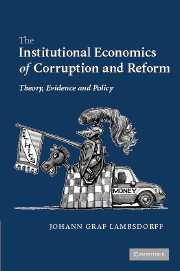Book contents
- Frontmatter
- Contents
- List of boxes
- Acknowledgements
- A roadmap to this book
- 1 Introduction
- 2 Enemies of corruption
- 3 What is bad about bureaucratic corruption? An institutional economic approach
- 4 The dilemma of the kleptocrat: What is bad about political corruption?
- 5 Corruption and transactions costs: The rent-seeking perspective
- 6 Making corrupt deals: contracting in the shadow of the law
- 7 Exporters' ethics and the art of bribery
- 8 How confidence facilitates illegal transactions: An empirical approach
- 9 Corrupt relational contracting
- 10 Concluding thoughts
- Appendix: Technical Details to the Transparency International Corruption Perceptions Index
- References
- Subject index
5 - Corruption and transactions costs: The rent-seeking perspective
Published online by Cambridge University Press: 05 November 2009
- Frontmatter
- Contents
- List of boxes
- Acknowledgements
- A roadmap to this book
- 1 Introduction
- 2 Enemies of corruption
- 3 What is bad about bureaucratic corruption? An institutional economic approach
- 4 The dilemma of the kleptocrat: What is bad about political corruption?
- 5 Corruption and transactions costs: The rent-seeking perspective
- 6 Making corrupt deals: contracting in the shadow of the law
- 7 Exporters' ethics and the art of bribery
- 8 How confidence facilitates illegal transactions: An empirical approach
- 9 Corrupt relational contracting
- 10 Concluding thoughts
- Appendix: Technical Details to the Transparency International Corruption Perceptions Index
- References
- Subject index
Summary
Introduction
Corruption is bad not because money and benefits change hands, and not because of the motives of participants, but because it privatizes valuable aspects of public life, bypassing processes of representation, debate, and choice.
(Thompson 1993)Should corruption be facilitated or impeded? At the core of this book is the idea that we should make corruption as arduous as possible. The downside effects should be felt strongly by those willing to take bribes and embezzle public funds. But some theorists were busy arguing in favor of the opposite. They claimed that corruption should be facilitated because otherwise lobbying for preferential treatment would generate wasteful competition. I show that this conclusion is misguided – our effort must be directed toward increasing the transaction costs of corruption.
As we have argued in Chapter 4, some concept of public interest may be at the center of definitions of political corruption. Therefore, welfare economics can be a starting point for analyzing corruption because it allows for a distinction to be made between useful and wasteful political actions. An early approach in this vein has been presented by the traditional rent-seeking theory. This approach considers various forms of seeking preferential treatment in the realm of public decision-making, for example, through competitive lobbying and corruption.
- Type
- Chapter
- Information
- The Institutional Economics of Corruption and ReformTheory, Evidence and Policy, pp. 109 - 135Publisher: Cambridge University PressPrint publication year: 2007



